Femia > Health Library > Pregnancy > Pregnancy health > Getting a Pap smear during pregnancy: safety, timing, and what to expect
Getting a Pap smear during pregnancy: safety, timing, and what to expect
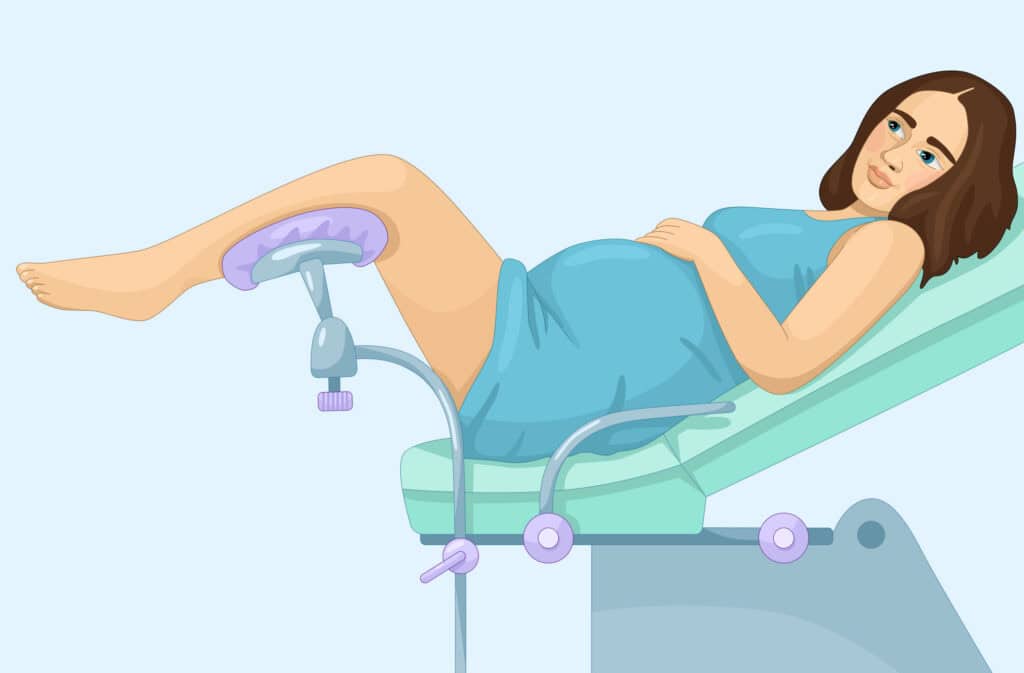
- Updated Feb 10, 2025
- Published
CRAFTED BY HUMAN
Crafted by human At Femia, we provide accurate and up-to-date information at every stage of your journey, from trying to conceive, pregnancy and postnatal support. All content is created by a real person based on in-depth research and own professional experience. Femia ensures that you will receive expert advice, strict accuracy and a personalized approach from our authors/medical experts. Learn more about our editorial policy.
FACT CHECKED
Fact checked At Femia Health, we maintain the highest standards of editorial excellence in delivering content focused on helping you conceive, guiding you through pregnancy, and supporting you postpartum. Explore our content review principles to learn how we ensure the accuracy and quality of our health and lifestyle tips for every stage of your journey.
It’s perfectly safe to have a Pap smear during pregnancy if your doctor offers you one.
During a Pap smear, your doctor collects a cell sample from the outside of your cervix while your baby remains safely tucked away inside your uterus. Pap smears may not be your favorite prenatal test, but they save lives, so you shouldn’t skip or postpone this exam unless absolutely necessary.
During pregnancy, you may feel anxious about your health and the health of your baby. All moms-to-be feel this way; after all, you’re carrying some precious cargo.
Many people don’t attend regular healthcare appointments until they become pregnant. A 2021 study published in BMC Pregnancy & Childbirth found pregnancy was a motivating factor for women looking to improve their health. For this reason, your OBGYN may be keen to tick a Pap smear off your to-do list during pregnancy-related appointments.
A Pap smear is a routine cancer screening test. If you’re currently pregnant (congratulations!), you may be wondering if you can get a Pap smear while pregnant.
Note: While “Pap smear” is an accepted term that is understood by many, the medical community is moving toward using “Pap test” or “cervical screening” when describing the process. This change is due to improved technologies where the cells are no longer smeared on a glass slide for review but are analyzed by other more advanced techniques.
In addition, the Pap is becoming outdated and many countries are moving towards incorporation of HPV testing either as the first test or together with a Pap test. HPV testing is more sensitive and specific for the detection of cervical disease, especially in women aged 25 and older.
👉Find out more: Can you get piercings while pregnant?
Why might I have a Pap smear during pregnancy?
A Pap smear is a routine screening test that poses no risk to your pregnancy. Lots of women have Pap smears during pregnancy, so you can trust that this is a safe and common prenatal procedure. There are lots of reasons why you may attend a Pap smear while pregnant, such as:
- It’s time for your routine Pap smear, which should take place every three to five years, depending on your medical history.
- You are behind on your routine Pap smear screenings.
- You are due for a follow-up appointment for a previous Pap smear.
A Pap smear is a screening test that detects changes to your cervix. The test identifies precancers, changes that could potentially become cervical cancer if left untreated. A Pap smear isn’t a test for cancer; it’s a screening test to prevent future cancers. Cervical cancer can be asymptomatic, so regular screening is crucial.
In the US, screening generally starts at age 21 and continues every three to five years depending on your medical history and previous test results. The age eligibility for screening varies from country to country, so check your national screening guidelines for the exact age.
If you don’t know why your doctor is offering the screening, ask. If you didn’t attend your last Pap smear, your doctor may want to perform one during a routine prenatal visit to ensure you are up to date. Playing an active role in your healthcare will benefit both you and your baby, so don’t be afraid to ask your healthcare provider questions like these.
👉Find out more: When to start perineal massage: A comprehensive guide
designed just for you
Personalized meal plans, symptom tracking, and more with the Femia
Is it safe to get a Pap smear while pregnant?
Yep, Pap smears are safe during pregnancy. These tests carry no risks for your unborn child.
Your cervix is the lower part of the uterus and projects into the upper part of the vagina. It acts as the gateway to your uterus and plays an important role in pregnancy and birth. A Pap smear is the collection of a cell sample from the outside of your cervix.
Spatula or brush will not come into contact with your baby, who will be safely on the other side of your cervix inside your uterus. Countless pregnant women have this test each year without harming their babies.
A 2016 study published in the International Journal of Community Medicine and Public Health found that Pap smear tests did not impact pregnancy and were safe to carry out during pregnancy.
👉Find out more: Can you get Botox while pregnant?
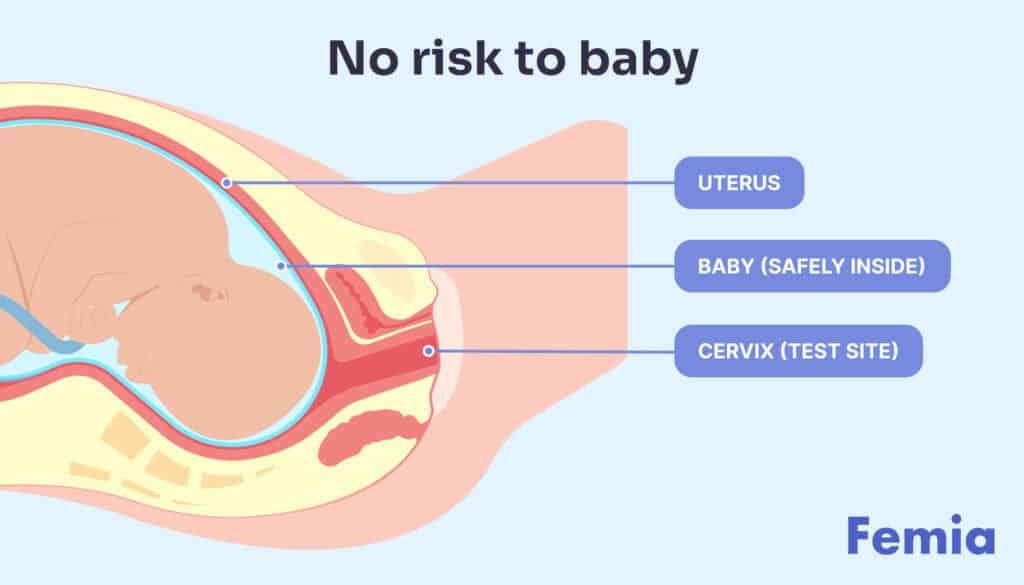
Can a Pap smear cause a miscarriage in early pregnancy?
Though many women worry Pap smears may cause miscarriage, this is definitely not the case. Pap smear screening tests are not associated with an increased risk of miscarriage. Pap smears do not cause miscarriage. There is no risk to you or your baby from a Pap smear during pregnancy.
👉 Find out more: Which food can cause miscarriage: A comprehensive guide
What if you’re bleeding after a Pap smear while pregnant?
Light spotting (bleeding) and light cramping are common after a Pap smear. While these aren’t fun symptoms, they’re generally nothing to worry about. Your doctor will gently collect a sample of cells from your cervix, and this can cause some light bleeding after the test. Your cervix is more sensitive during pregnancy and more easily irritated.
Though the sight of blood in your underwear during pregnancy can be alarming, remember that the light bleeding is from your cervix. Your baby is still tucked up safe and sound in your uterus.
If you are experiencing more than light bleeding or are suffering from heavy cramps after your Pap smear, alert your healthcare provider. If you are still experiencing bleeding after a few hours, seek medical attention. It’s always worth seeking reassurance from your healthcare provider if you have concerns about your pregnancy.
How to understand Pap smear results?
After the Pap smear, your cell sample goes to a laboratory for testing. You’ll receive your results by letter within three weeks. There are three possible categories of Pap smear results:
- Normal
- Abnormal or unclear (ASC-US)
- Unsatisfactory
👉Find out more: How to get short-term disability approved while pregnant by a doctor
What happens if a Pap smear during pregnancy is abnormal or unclear?
If your results declare abnormal cells, your doctor will follow up to determine the best course of action. Try not to panic; an abnormal Pap smear result does not mean you have cancer. Pregnancy can compromise your immune system, leaving you at higher risk of abnormal cells. Your doctor will recommend the best course of action.
If your pregnancy Pap smear is abnormal, your doctor may recommend a close follow-up in 1 or 3 years or colposcopy. During a colposcopy, a colposcopist will use a special microscope to look at your cervix.
An abnormal test result will specify whether you have low or high grade dysplasia. Dysplasia simply means the existence of abnormal cells. Low-grade changes often resolve without help, so your doctor may assume a wait-and-see approach to low-grade changes. For high-grade changes, your doctor may want to start treatment sooner. Some women find that their high grade dysplasia clears up by itself after pregnancy.
Further testing is needed if your results come back as unclear (ASC-US) or inconclusive. This result means your cells appear to be abnormal, but it’s unclear why. The hormonal changes of pregnancy could be to blame, but your doctor will want to run further tests to rule out other causes.
What happens if my Pap smear result is normal?
A normal result means the test didn’t detect abnormal cells on your cervix. This means your chance of developing cervical cancer in the next few years is low, but it’s essential to attend future cervical screenings to detect any changes. Your doctor will invite you back for your next routine test in three to five years.
What happens if my Pap smear result is unsatisfactory?
An unsatisfactory result means there weren’t enough cells in the sample or the cells had clumped together. Your doctor will invite you back for a repeat Pap smear in a few months.
How to understand my HPV test Results
HPV testing is often done together with Pap smears. Your results may include:
Negative HPV Test: No high-risk HPV types found.
Positive HPV Test: High-risk HPV types found. This doesn’t mean you have cervical cancer, but it requires further monitoring.
Regular screening and follow-up are essential for preventing cervical cancer. Always discuss your results and next steps with your doctor.
What happens during a Pap smear during pregnancy?
Your Pap smear will take place at your OBGYN’s office or clinic as part of a routine prenatal appointment. You’re likely already familiar with Pap smears, and there are no real changes to the procedure during pregnancy. The use of foot rests is common in the US, but if you find it uncomfortable, tell your doctor you’d like to try a different position.
Your doctor will use a speculum to look inside your vagina. The speculum is a smooth, tube-shaped tool which opens the vagina to allow your doctor to see your cervix. Your doctor will visually check your cervix and use a soft brush to collect a small sample of cells to send to a laboratory for further testing. While it’s not pleasant, it shouldn’t be painful, so be sure to speak up if you’re experiencing discomfort.
How to prepare for a Pap smear
To prepare for your Pap smear, avoid intercourse for 48 hours before the procedure. You should also avoid douching, vaginal medication, and spermicidal foam for 48 hours. If you forget to avoid these activities, it’s still important to attend your appointment, but mention it to the doctor in case it impacts your results.
You may be wondering whether you need to shave or wax before a Pap smear. The good news is, there’s no need to remove your body hair for the procedure. Shaving down there can be challenging at the best of times but even trickier when you can’t see what you’re doing because of your bump, yikes! Your healthcare provider won’t care what you look like; they simply want to ensure your cervix is in good health.
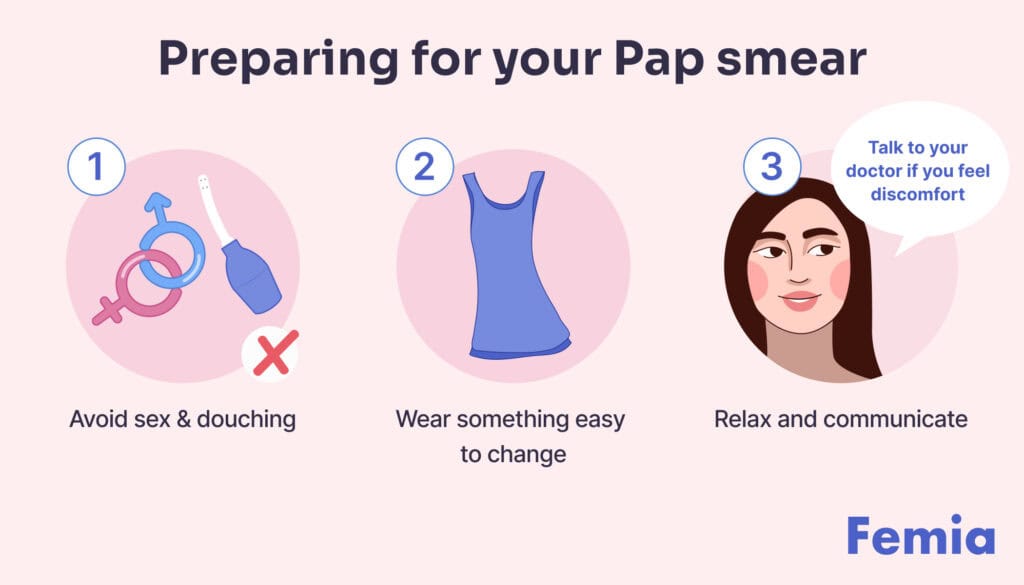
Are Pap smears painful during pregnancy?
No, generally speaking, Pap smears are not painful during pregnancy. A Pap smear may be uncomfortable, but it shouldn’t be painful. For most women, the most uncomfortable part is when the doctor places the speculum.
If you experience pain during the procedure, alert your doctor right away. A Pap smear isn’t likely to make it onto your list of top ten pregnancy moments, but it’s a crucial test that saves lives, so don’t put it off.
How often should I have a Pap smear?
You’ll have your first Pap smear at age 21. Then, your doctor will invite you for a routine Pap smear every three years until age 30.
Once you reach age 30, you have several options for cervical screening. From age 30, your doctor may offer you:
- An HPV test – a negative result means you can wait five years before repeating the test.
- A Pap smear – a negative result means you can wait three years before repeating the test.
- An HPV test and a Pap smear – a negative HPV result along with a normal Pap smear result means you can wait five years before repeating the test.
Speak to your doctor to determine which screening test is right for you. You may be able to stop routine cervical screening once you reach 65 years old.
designed just for you
Personalized meal plans, symptom tracking, and more with the Femia
The bottom line
Pap smears are safe during pregnancy and do not increase your risk of miscarriage. A Pap smear is a life-saving cancer screening tool. It gives your doctor insight into the health of your cervix at the time of the test, but you should repeat the test every few years to protect your health.
Many OBGYNs include Pap smears in their regular prenatal tests where appropriate. Speak to your doctor about Pap smears to find out whether you’re due for one during pregnancy. Ensure you attend all future screening appointments to protect your health.
References
- What Should I Know About Screening? https://www.cdc.gov/cancer/cervical/basic_info/screening.htm.
- Why Are Many Women Overdue for Cervical Cancer Screening? (February 22nd 2022) National Cancer Institute https://www.cancer.gov/news-events/cancer-currents-blog/2022/overdue-cervical-cancer-screening-increasing.
- Bagherzadeh R, Gharibi T, Safavi B, Mohammadi SZ, Karami F, Keshavarz S. Pregnancy; an opportunity to return to a healthy lifestyle: a qualitative study. BMC Pregnancy Childbirth. 2021 Nov 5;21(1):751. doi: 10.1186/s12884-021-04213-6. PMID: 34740317; PMCID: PMC8569967. https://www.ncbi.nlm.nih.gov/pmc/articles/PMC8569967/#.
- Manikkam, B. (2016). Screening for cervical cancer during pregnancy. International Journal Of Community Medicine And Public Health, 3(9), 2493–2498. https://doi.org/10.18203/2394-6040.ijcmph20163059.

Discover why you might feel nauseous after sex. Learn about common causes of post-sex nausea and lower abdominal pain. Expert advice from Femia.
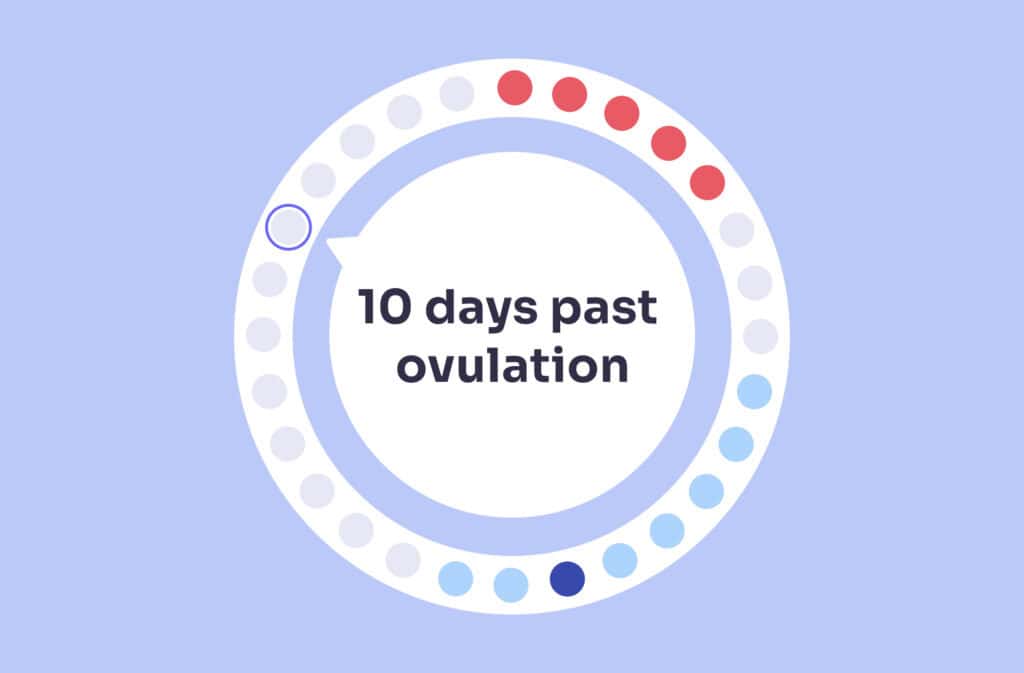
Explore the early symptoms at 10 days past ovulation (10 DPO), body changes and find out when to take a pregnancy test for the most accurate results. Expert advice from Femia.
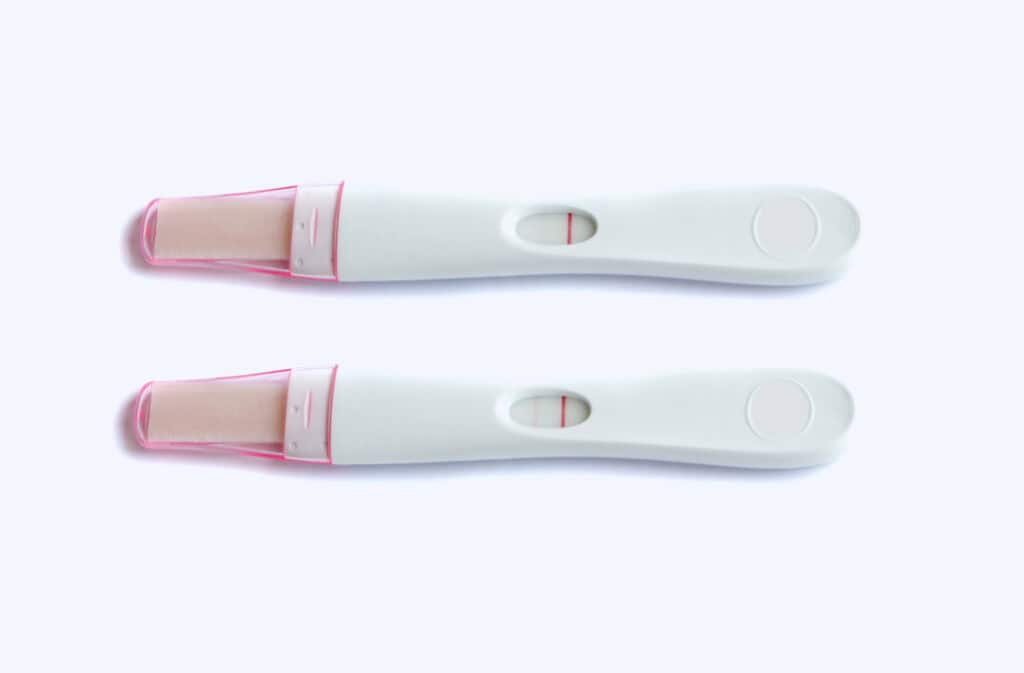
Evaporation lines vs faint positive results on pregnancy tests, including very faint lines almost invisible. Discover 3 key differences to accurately interpret pregnancy test results.

